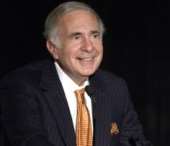 On Wednesday, July 15th, at the Delivering Alpha conference, Carl Icahn debated Larry Fink, with the moderating/refereeing services of Scott Wapner of CNBC.
On Wednesday, July 15th, at the Delivering Alpha conference, Carl Icahn debated Larry Fink, with the moderating/refereeing services of Scott Wapner of CNBC.
The Icahn/Fink debate wasn’t labelled as a debate. It was a “panel.” But it was a panel of two (aside from Wapner, who was of there in an officiating capacity), and it was a panel of two who have quite predictably contrasting opinions about the subject proposed for their discussion: activist investing. Just two months ago, Fink wrote a much-noted letter saying that too many leaders are using share buybacks to keep short term traders happy. Icahn is chief among those they are alleging striving to mollify. In short: this was a debate.
So at Delivering Alpha, Fink, the chief executive of BlackRock, again made the case that hedge fund activists –or at least “some” of them – play a negative role in markets today. In particular, they too often press companies to buy back increasing amounts of stock even with borrowed money and (in Fine’s view) that isn’t a healthy thing for companies to do. In his words, this “may be good for the short term strategy, but it can be perilous for the long term viability of the company.”
Icahn Sees a Bubble
BlackRock itself can be a “quiet partner with management” or it can “privately push” management to take measures it ought to take. But share repo is presumably not one of those measures, or not often. Fink is “deeply worried” that share repo with high yield debt is “one of the reasons why we have a below trend-line economy, we’re not investing for the future as much as we should.”
Icahn predictably took a very different view. Passive investment (at least passive investment of a specific sort, the sort of structured securities that BlackRock creates) is the problem, and active investing is the solution.
Interest rates will go up, and the danger facing the economy right now is that everybody now holding many of the products, especially the ETFs that BlackRock sells, will want to sell them all at once. After all, when interest rates go up, the ultra-safe Treasuries will start to look good, and the case for high-yield stuff will weaken. Yet as the investors all talk to each other at the “cocktail parties” that Icahn imagines and they all decide to sell the REITs, nobody will be around on the other side. Nobody will want to buy.
Icahn was in effect saying that ETFs constitute a bubble, and that the bubble is about to burst. What he did say, explicitly, was that the danger of ETFs today is that they will set off a crisis that will exceed that caused by the seizing-up of the subprime mortgage and mortgage derivatives market in 2007. He also recounted something he has told his daughter: the market is a bus driven by Janet Yellen and Funk. It is about to spin out of control “and hit a black rock.”
An aside: Larry Fink on Greece
It wasn’t a subject of the “panel,” but: since I’ve got Larry Fink on the mind, I’d like to check back on a statement Fink made in April of this year about an issue that was front-burner for investors both then and now: Greece.
Fink said then that the markets had it wrong about the consequences of the Greek debt crisis for assets associated with the rest of Europe: that the latter had been priced too pessimistically. “I’d be buying today,” into such assets, he said.
What about the euro itself, then? Where has it been going since Fink spoke those words? I can’t report any impressive change. The EUR/USD exchange rate has remained in the neighborhood of 1.10 since Fink made those comments and is there still. For that matter, the EUR/GBP rate is even flatter. It has spent the last three months just to the north of 0.7, and has in recent days shifted just to the south of that line.
That non-news doesn’t really help confirm Fink’s original point. If the markets were wrong then, they are still wrong and wrong in the same way now. Another hypothesis: the markets had accurately divined by mid-April the developments since, and so everything had been rationally discounted and no subsequent swings have been necessary. That is: the exchange rates are at least consistent with the view that the markets had it right.
The euro has shown some strength against the yen in recent months, but surely the pertinent news there comes from Japan, not Europe.
I’ve allowed myself to drift from the Delivering Alpha conference. In Part Two, I’ll get back to it, and discuss another highlight: John Paulson’s discussion of merger arb opportunities today.



